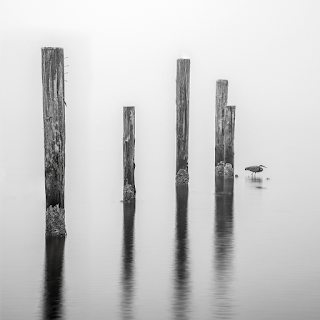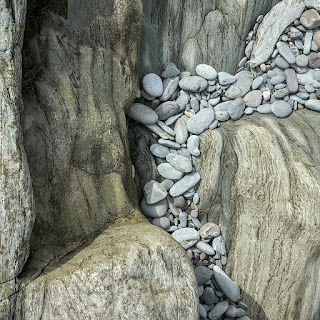“So I say to you –
This is how to contemplate our
conditioned existence in this fleeting world:
'Like a tiny drop of dew,
or a bubble floating in a stream;
Like a flash of lightning
in a summer cloud,
Or a flickering lamp, an illusion,
a phantom, or a dream.'
'So is all conditioned
existence to be seen.'
Thus spoke Buddha."
Tuesday, November 23, 2021
An Illusion, a Phantom, or a Dream
Monday, November 22, 2021
Macro and the Micro
- Ansel Adams (1902 - 1984)
Letter to Alfred Stieglitz
Postscript. The purest simplest joy of life is life itself: living, being, breathing, seeing, feeling, sharing, ... But there are preternaturally precious moments when the experience is so all-consuming and so far transcends what words alone are incapable of revealing (though the wisest among us are sometimes able, in Zen-like fashion, to capture glimpses of the deepest truths), that one is simply lost in the Einsteinian awe of it all ("I have nothing but awe when I observe the laws of nature," as quoted in Einstein and the Poet). For me, this happens (alas, far less frequently than I wish) when I become "lost" amidst the "macro and the micro"; when otherwise arbitrary language-driven distinctions among trees and forest and leaves and space and time ... all dissolve and become one and inseparable. A feeling that seems to be also shared by my eldest son, Noah, who is seen here contemplating his own universe of mysteries by the side of a small footpath he and I took this weekend in a local park:
Tuesday, November 02, 2021
Wu Wei
- Benjamin Hoff (1946 - )
The Tao of Pooh
Thursday, October 21, 2021
The Nature of Water
- Bruce Lee (1940 - 1973)
Artist of Life
Wednesday, October 20, 2021
Beyond Language
- Inger Christensen (1935 - 2009)
The Condition of Secrecy
Thursday, October 14, 2021
Just Follow the Stream
Think of the method
as a fine silvery stream,
not a raging waterfall.
have faith in its course.
meandering here,
trickling there.
It will find the grooves,
the cracks, the crevices.
Never let it out of your sight.
It will take you."
- Sheng-yen (1931 - 2009)
Postscript. The image reveals the upper part of the 6th waterfall (out of a total of 7) that rewards hikers taking the "Brooks Walk" trail at the Castle In The Clouds conservation area in New Hampshire (located in the Ossipee Mountains of Moultonborough and Tuftonboro, to the northeast of lake Winnipesauke). Since my wife and I had only a few precious days over a long weekend to admire the gorgeous northeast fall colors, our time on trails was necessarily limited. Well known photographer-friendly hikes were all but off limits, partly due to the expected requisite time and effort and partly due to the vast - and unforeseen (at least by me) - crowds of fellow-hikers! Admittedly, the last time I was in New Hampshire was as a teenager on a family trip with my parents (c.1975); i.e., just a wee bit in the past. But while I didn't expect the half-dozen or so cars parked unobtrusively by the side of the road I remember seeing back then, I was still shocked to find massive 200+car parking lots with timed entry! It was the same kind of "dissonance between memory and reality" shock I experienced on a 2012 trip to Yellowstone. Luckily, other less populated areas (than, say, the Franconia Notch area where the parking/hiking logjam appeared most rampant) still exist; like the Castle in the Clouds, for which I have to thank my wife for finding! So, rather than giving up all hope and skedaddling back to our cabin (in very not-Zen fashion), within the span of a few hours I went from commiserating over being unable to park, hike, and take pictures, to parking (with ease), eating (at a nice cafe close to a parking lot with few cars), hiking (on a beautifully maintained trail barely 100 feet from both car and cafe), and having an almost embarrassingly easy time communing with and composing my pick of waterfalls! Lessons: (1) stop basing expectations on 50-yo memories, (2) be flexible and mindful of unforeseen opportunities, and (3) listen to what your wife suggests doing instead :)
Tuesday, August 31, 2021
Similarity of Form
of understanding and pays
no regard to similarity of form.
The world in general is attracted
by similarity of form,
but remains indifferent to
similarity of understanding."
- Lie Yukou (c.400 BCE)
Sunday, August 29, 2021
Transparent as a Dragonfly
- Italo Calvino (1923 - 1985)
Saturday, April 24, 2021
Other Worlds
and would even change the course of events not only on
earth, but in other worlds?” I asked my teacher.
“There is,” my teacher answered me.
“Well, what is it?” I asked.
“It’s...” began my teacher and suddenly fell silent.
But he was silent.
And I stood and was silent.
And he was silent.
And I stood, silent.
And he was silent.
We’re both standing and silent.
Ho-la-la!
We’re both standing and silent.
Ho-le-le!
standing and silent!"
- Daniil Kharms (1905 - 1942)
Postscript. Daniil Kharms is one of my all-time favorite authors of the "absurd." The best, purest form of absurdist literature - such as its uniquely Russian incarnation (called the Oberiu) in the 1920s and 1930s, which included such luminaries as Alexander Vvedensky, Nikolai Zabolotsky, and Konstantin Vaginov - shares much with its spiritual cousin, the Zen koan. Its twists of logic, humor, and hallucinatory distortions of babble and reality often - unexpectedly - point to the deepest truths. For those of you who share my affection for these kinds of inner journeys of discovery, a great place to start is with this collection of Kharms' writings: Today I Wrote Nothing, from which the following passage is quoted (from the story, “The Werld”):
"I told myself that I see the world. But the whole world was not accessible to my gaze, and I saw only parts of the world. And everything that I saw I called parts of the world. And I examined the properties of these parts and, examining these properties, I wrought science. I understood that the parts have intelligent properties and that the same parts have unintelligent properties. And there were such parts of the world which could think. And all these parts resembled one another, and I resembled them. And I spoke with these parts. And suddenly I ceased seeing them and, soon after, other parts as well. But then I understood that I do not see parts independently, but I see it all at once. At first I thought that is was NOTHING. But then I understood that this was the world and what I had seen before was NOT the world.
And then I realized
I am the world.
But the world - is not me.
Although at the same time
I am the world.
But the world's not me.
And I'm the world.
But the world's not me.
And I'm the world.
But the world's not me.
And I'm the world.
And after that
I didn't think anymore more."
Friday, April 23, 2021
Abide in Quietude
- The Mahavagga of the Vinya Pitaka,
The Buddha: His Life, His Doctrine, His Order,
by Herman Oldenberg (1854 - 1920)
Thursday, April 08, 2021
Centering
- Dag Hammarskjöld (1905 - 1961)
Markings
Monday, March 15, 2021
Lines of Meaning
everything has not been written;
we are not turning into phantoms.
We walk the corridors,
searching the shelves
and rearranging them,
looking for lines of meaning
amid leagues of cacophony
and incoherence,
reading the history of
the past and our future,
collecting our thoughts
and collecting the
thoughts of others,
and every so often
glimpsing mirrors,
in which we may recognize
creatures of the information."
- Jorge Luis Borges (1899 - 1986)
The Library of Babel
Sunday, February 21, 2021
Abstract Forms
- Rupert Spira (1960 - )
Presence: The Art of Peace and Happiness
Sunday, February 07, 2021
Beyond One's Reach
in many so-called symbols
is exactly their vagueness,
their openness,
their fruitful ineffectiveness
to express a 'final' meaning,
so that with symbols
and by symbols one
indicates what is always
beyond one's reach."
- Umberto Eco (1932 - 2016)
Semiotics and the Philosophy of Language
Friday, February 05, 2021
Just Sitting
mind moment by moment.
But we refrain from doing
anything with our thoughts.
We just let everything come
up freely and go away freely.
We don’t grasp anything.
We don’t try to control anything.
We just sit."
- John Daido Loori (1931 - 2009)
The Art of Just Sitting
Wednesday, January 13, 2021
"This is a Zen camera"
by the dream camera,
reading the Zen anthology
...
“Marvelous, silent,
vast spaces around
the old buildings.
Cold, pure light, and
some grand trees….
How the blank side of a
frame house can be
so completely beautiful
I cannot imagine.
A completely miraculous
achievement of forms.”
“Paradise is all around us
and we do not understand...
'wisdom,' cries the dawn deacon,
but we do not attend.”
- Thomas Merton (1915 - 1968)





















